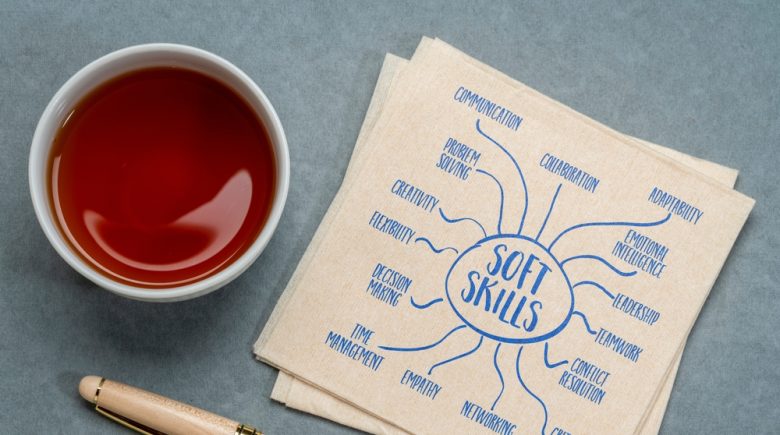Nowadays, in the ever-changing and very competitive job market it is not enough to only have technical skills or a good education. Employers are nowadays more and more appreciating the soft skills, i.e. those personal features that help a person to communicate efficiently and harmoniously with others. Soft skills go along with hard skills and thus they help a person to adjust, cooperate, and communicate in different work situations.
Understanding Soft Skills
Soft skills or the people’s skills which is often used to refer to interpersonal, are a wide range of abilities. These are communication, teamwork, problem-solving skills, time management and emotional intelligence along with the adaptability. Unlike the hard skills which are specific, teachable abilities or knowledge sets ( such as coding, accounting, engineering) soft skills are more about how you work than what you know. They are a part of one’s character and they get polished through the life events and interactions.
Communication
Efficient communication is the core skill that supports almost all job related issues. It refers to the capacity of transmitting information in a straightforward and efficient way both orally and in written form. The excellent communicators can convey their thoughts, listen actively and participate in the meaningful conversation with colleagues, clients and bosses.
Nowadays, when the remote work and virtual teams are getting more popular due to the digital age, communication skills have become even more important. The instruments such as email, instant messaging and video conferencing are very useful in the communication but to avoid misunderstandings one should be clear and brief during the interaction. The professionals who can smoothly move in these communication channels are usually considered to be more reliable and competent.
Teamwork and Collaboration
In any sector, teamwork is the main component of most job positions. The skill of being a team player, sharing the responsibilities and giving to the common goal is appreciated by employers. The successful collaboration is based on the mutual respect, openness to diverse views and the ability of negotiation and compromise.
The collaboration is the place where soft skills like, for example, empathy, patience and conflict resolution are so necessary. The capacity to comprehend and react to the emotional state of your colleagues together with their point of view builds a good work culture which in turn leads to more innovative and effective solutions. The workplaces are now more diverse, hence the skill of working with people from different backgrounds and cultures is becoming more vital.
Problem-Solving and Critical Thinking
Problem-solving and critical thinking are the soft skills that make people able to deal with problems in a perfect way. These skills are the ones that deal with, for instance, processing information, coming up with new ideas and making wise choices. In a work environment that is moving too fast, the skill to spot problems and come up with practical solutions very quickly is highly useful.
Employers look for the applicants who can think quickly, fit to the changing situations and have a strategic approach in solving problems. The critical thinkers can go into the depth of the complicated problems, scrutinize options and finally apply solutions that will make organizations succeed. The top performers do not wait for the problem to occur, they anticipate it and solve it before the others even notice.
Time Management
Time management is a very important soft skill, which directly affects productivity and efficiency. It is the skill of making a choice between different tasks, arranging one’s time in such a way that all work can be done and meeting deadlines. The good time management skills are the guarantee that work is done on time and resources are used properly.
Emotional Intelligence
Emotional intelligence (EI) is the skill to be aware of, comprehend and control one’s own feelings as well as those of others. The high level of EI is the reason for good teamwork, leadership and interpersonal relationships. People with the high emotional intelligence are usually more empathetic, self-aware and can cope with stress better.
In the working area, emotional intelligence creates a good and friendly atmosphere. It enables people to go through the social intricacies, form better relations and deal with conflicts in a right way. The leaders with the high EI are more capable of motivating their teams, giving them a constructive feedback and creating an open culture where everyone feels appreciated.
Adaptability
The contemporary work environment is a world of non-stop changes that are caused by the progress in technology, changeable business models and unstable market requests. Adaptability is the soft skill that makes people to be successful in this ever-changing environment. It is characterized by the readiness to accept new ideas, the ability to adapt and change as well as the strength of will in face of difficulties.
Flexible workers are the fast learners who can change their way of doing things to solve new problems. They are not scared to leave their familiar environment and they often the first ones who choose new technologies or processes. Such a flexibility makes them very useful to any organization, particularly in the industries that are being changed at a rapid pace.
Developing Soft Skills
Even though soft skills are generally those which you acquire without a conscious effort, they can be improved and enhanced with the passage of time. Here are some strategies for enhancing soft skills:
–> Seek Feedback
Frequently, you should seek for the feedback from your colleagues, supervisors and mentors to have a clear picture of what are your strong points and where do you need some polishing.
–> Practice Active Listening
Concentrate on to the real comprehension of what others are saying, not just waiting for your turn to speak. Thus, the exchange of views is easier and relationships are developed more effectively.
–> Engage in Self-Reflection
Reflect on your interactions and experiences, which you should do in the first place. Think of the things that went well and those that could be worked on.
–> Take on New Challenges
Leave your comfort zone by doing new projects or roles that need other skills. This will in turn, lead to the forming of adaptability and problem-solving skills.
–> Invest in Training and Development
Be involved in the workshops, courses and seminars that are mainly based on soft skills. A lot of companies provide training courses to enable the staff members to acquire these vital skills.
–> Build Emotional Intelligence
Be mindful, show empathy and learn how to cope with stress in order to increase your emotional intelligence.
–> Join Professional Networks
Get involved in the professional organizations and networks to make friends, share ideas and learn from other people.
Conclusion
Finally, one should not under the estimate of soft skills in today’s job market as they are the key to career success. They improve your skills of communication, cooperation, solving problems, time management and adaptability to a change. The workplace is changing and therefore, the significance of soft skills will be even greater which makes them a key part of professional development. Through the acquisition and development of these skills, people can open the door to their full potential and thus, will be able to realize a long-term career success.
Nowadays, in the ever-changing and very competitive job market it is not enough to only have technical skills or a good education. Employers are nowadays more and more appreciating the soft skills, i.e. those personal features that help a person to communicate efficiently and harmoniously with others. Soft skills go along with hard skills and thus they help a person to adjust, cooperate, and communicate in different work situations.
Understanding Soft Skills
Soft skills or the people’s skills which is often used to refer to interpersonal, are a wide range of abilities. These are communication, teamwork, problem-solving skills, time management and emotional intelligence along with the adaptability. Unlike the hard skills which are specific, teachable abilities or knowledge sets ( such as coding, accounting, engineering) soft skills are more about how you work than what you know. They are a part of one’s character and they get polished through the life events and interactions.
Communication
Efficient communication is the core skill that supports almost all job related issues. It refers to the capacity of transmitting information in a straightforward and efficient way both orally and in written form. The excellent communicators can convey their thoughts, listen actively and participate in the meaningful conversation with colleagues, clients and bosses.
Nowadays, when the remote work and virtual teams are getting more popular due to the digital age, communication skills have become even more important. The instruments such as email, instant messaging and video conferencing are very useful in the communication but to avoid misunderstandings one should be clear and brief during the interaction. The professionals who can smoothly move in these communication channels are usually considered to be more reliable and competent.
Teamwork and Collaboration
In any sector, teamwork is the main component of most job positions. The skill of being a team player, sharing the responsibilities and giving to the common goal is appreciated by employers. The successful collaboration is based on the mutual respect, openness to diverse views and the ability of negotiation and compromise.
The collaboration is the place where soft skills like, for example, empathy, patience and conflict resolution are so necessary. The capacity to comprehend and react to the emotional state of your colleagues together with their point of view builds a good work culture which in turn leads to more innovative and effective solutions. The workplaces are now more diverse, hence the skill of working with people from different backgrounds and cultures is becoming more vital.
Problem-Solving and Critical Thinking
Problem-solving and critical thinking are the soft skills that make people able to deal with problems in a perfect way. These skills are the ones that deal with, for instance, processing information, coming up with new ideas and making wise choices. In a work environment that is moving too fast, the skill to spot problems and come up with practical solutions very quickly is highly useful.
Employers look for the applicants who can think quickly, fit to the changing situations and have a strategic approach in solving problems. The critical thinkers can go into the depth of the complicated problems, scrutinize options and finally apply solutions that will make organizations succeed. The top performers do not wait for the problem to occur, they anticipate it and solve it before the others even notice.
Time Management
Time management is a very important soft skill, which directly affects productivity and efficiency. It is the skill of making a choice between different tasks, arranging one’s time in such a way that all work can be done and meeting deadlines. The good time management skills are the guarantee that work is done on time and resources are used properly.
Emotional Intelligence
Emotional intelligence (EI) is the skill to be aware of, comprehend and control one’s own feelings as well as those of others. The high level of EI is the reason for good teamwork, leadership and interpersonal relationships. People with the high emotional intelligence are usually more empathetic, self-aware and can cope with stress better.
In the working area, emotional intelligence creates a good and friendly atmosphere. It enables people to go through the social intricacies, form better relations and deal with conflicts in a right way. The leaders with the high EI are more capable of motivating their teams, giving them a constructive feedback and creating an open culture where everyone feels appreciated.
Adaptability
The contemporary work environment is a world of non-stop changes that are caused by the progress in technology, changeable business models and unstable market requests. Adaptability is the soft skill that makes people to be successful in this ever-changing environment. It is characterized by the readiness to accept new ideas, the ability to adapt and change as well as the strength of will in face of difficulties.
Flexible workers are the fast learners who can change their way of doing things to solve new problems. They are not scared to leave their familiar environment and they often the first ones who choose new technologies or processes. Such a flexibility makes them very useful to any organization, particularly in the industries that are being changed at a rapid pace.
Developing Soft Skills
Even though soft skills are generally those which you acquire without a conscious effort, they can be improved and enhanced with the passage of time. Here are some strategies for enhancing soft skills:
–> Seek Feedback
Frequently, you should seek for the feedback from your colleagues, supervisors and mentors to have a clear picture of what are your strong points and where do you need some polishing.
–> Practice Active Listening
Concentrate on to the real comprehension of what others are saying, not just waiting for your turn to speak. Thus, the exchange of views is easier and relationships are developed more effectively.
–> Engage in Self-Reflection
Reflect on your interactions and experiences, which you should do in the first place. Think of the things that went well and those that could be worked on.
–> Take on New Challenges
Leave your comfort zone by doing new projects or roles that need other skills. This will in turn, lead to the forming of adaptability and problem-solving skills.
–> Invest in Training and Development
Be involved in the workshops, courses and seminars that are mainly based on soft skills. A lot of companies provide training courses to enable the staff members to acquire these vital skills.
–> Build Emotional Intelligence
Be mindful, show empathy and learn how to cope with stress in order to increase your emotional intelligence.
–> Join Professional Networks
Get involved in the professional organizations and networks to make friends, share ideas and learn from other people.
Conclusion
Finally, one should not under the estimate of soft skills in today’s job market as they are the key to career success. They improve your skills of communication, cooperation, solving problems, time management and adaptability to a change. The workplace is changing and therefore, the significance of soft skills will be even greater which makes them a key part of professional development. Through the acquisition and development of these skills, people can open the door to their full potential and thus, will be able to realize a long-term career success.






